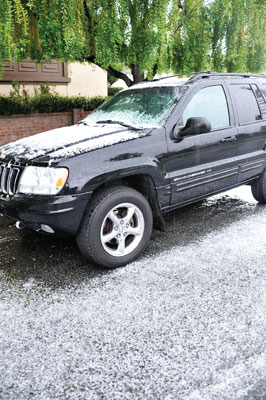Barry Bonds’ defense team apparently is convinced it did not
need to take a single swing at the prosecution’s perjury case to
knock it out of the park. After more than two weeks of testimony
from more than two dozen prosecution witnesses, some of whose
testimony was filled with wild pitches for the jury, Bonds’ defense
lawyers on Wednesday did not put on a single witness, setting up
closing arguments Thursday morning. Bonds’ lead defense attorney
Allen Ruby rose in the San Francisco courtroom, with the
prosecution’s case finished, and casually announced:
”
The defense rests.
”
SAN FRANCISCO
Barry Bonds’ defense team apparently is convinced it did not need to take a single swing at the prosecution’s perjury case to knock it out of the park.
After more than two weeks of testimony from more than two dozen prosecution witnesses, some of whose testimony was filled with wild pitches for the jury, Bonds’ defense lawyers on Wednesday did not put on a single witness, setting up closing arguments Thursday morning. Bonds’ lead defense attorney Allen Ruby rose in the San Francisco courtroom, with the prosecution’s case finished, and casually announced: “The defense rests.”
Follow Free Lance Sports on Twitter.
The defense’s decision to play the hand they have without calling any witnesses was not a particular surprise, given strong signals from the defense team in recent weeks that any case they mounted would be, at most, brief. And there was little doubt that Ruby’s fleeting hint at calling Bonds during Tuesday’s proceedings was a playful ploy, perhaps designed to force prosecutors to prepare for a cross-examination that was never going to happen.
Defendants seldom testify in criminal trials because of the risk, and legal experts have always predicted it would be far too dangerous to call Bonds in a perjury case that rests in large part on circumstantial evidence and inferences.
Ruby declined comment. But as the lawyers prepare for closing arguments, experts say the defense’s strategy is designed as a show of confidence for the jury. Jurors may begin deliberating as soon as Thursday afternoon.
“I read that as (Bonds’ lawyers) saying, “We don’t have to do anything, they haven’t proved their case beyond a reasonable doubt,” said Robert Talbot, a University of San Francisco law professor. “Why mess around.”
Greg Scott, Sacramento’s former U.S. attorney, agreed, calling the decision a “classic defense tactic in these types of cases.”
“They have to prove beyond a reasonable doubt he committed perjury,” Scott said of the prosecution. “The government’s case has been completely circumstantial. The defense has done the math and made a calculated, strategic decision the government has not” proven its case.
The 46-year-old Bonds faces three counts of perjury and one count of obstructing justice for allegedly lying to a federal grand jury in 2003 about using steroids as he chased baseball’s home run records. Federal prosecutors dropped a fourth perjury count on Wednesday, after it became clear U.S. District Judge Susan Illston was poised to dismiss it because of insufficient evidence to back it up during the trial.
Prosecutors, in their closing arguments, are likely to focus on several pieces of evidence that survived the defense’s assault and the fact they were without the testimony of Bonds’ former personal trainer, Greg Anderson, who is jailed for refusing to testify. (Anderson asked the judge to release him on Wednesday).
Among other things, prosecutors can present a drug test from baseball’s 2003 testing program that showed Bonds tested positive for a steroid and a female fertility drug used to mask the effects of steroids.
In addition, Kathy Hoskins, Bonds’ former personal shopper, testified that she saw Bonds injected in the stomach by Anderson, contradicting his grand jury testimony that he was never injected by anyone other than a doctor.
Defense lawyers, meanwhile, are expected to focus on the argument that Bonds did not knowingly take a steroid as of the time he testified before the grand jury, working to discredit the government’s witnesses, notably Kimberly Bell, the slugger’s former mistress, and Steve Hoskins, his former business associate, both of whom testified to knowledge of steroid use.
— Story by Howard Mintz, San Jose Mercury News










